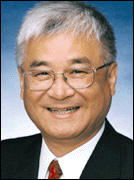

![]()
Pacific Perspective


![]()
Pacific Perspective
An ideological battle has been going on within the Chinese Communist Party as to whether party membership should be open to private entrepreneurs. Private entrepreneurs in
the Chinese Communist Party?This battle was triggered by President Jiang Zemin's remarks favoring the idea made at last month's 80th anniversary of the party's founding.
However, this battle appears to escalate to a level at which the party's unity is at risk. At this stage, it is unpredictable which side will come out as the eventual winner: President Jiang and his followers, or the party's conservative hard-liners who are vehemently against Jiang's decision.
Observations I made while attending the 2001 International Symposium on Industrial Development and Enterprise Reform in Nanchang recently suggests Jiang's approach has merit.
The symposium was hosted by the Jiangxi University of Finance and Economics and the China Society for Promotion of Industrial Economic Research and Development.
During my one-day excursion, a car was rented to drive from the Jingdezhen (porcelain) City to Nanchang.
The total was 750 yuan (or $90), which was broken down to 350 yuan ($42) for the rental cost (including the driver) and 400 yuan ($48) for the highway toll covering no more than 150 miles between the two cities.
Yes, the toll was almost $50 in a country where per capita GDP is less than $1,000.
Not surprisingly, the highway was virtually empty, which made me wonder about the marginal value of this highway and how much attention government decision makers paid to the financial feasibility of the project.
Like many other Asian economies, China has been experiencing the adverse impact of a "managed developmental strategy," which tends to underestimate the importance of the commercial orientation of whatever operational units or agencies are involved. Therefore, we should not be surprised to observe in China that a quarter of state-owned enterprises (SOEs) suffer operating losses.
In addition, the nonperforming loan ratio of the big four state banks (whose combined assets account for 75 percent of the total banking assets) is estimated to range from 25 percent to 40 percent because of government-directed lending to money-losing SOEs.
(Only three years ago, the four banks transferred a total of $169 billion in bad loans to their respective asset management companies).
The need to enhance the commercial orientation among banking and corporate sectors as well as the government sector is a critical challenge for China.
Now that the market economy is a fact of economic life, why not embrace private entrepreneurs as part of the decision-making teams in the Party?